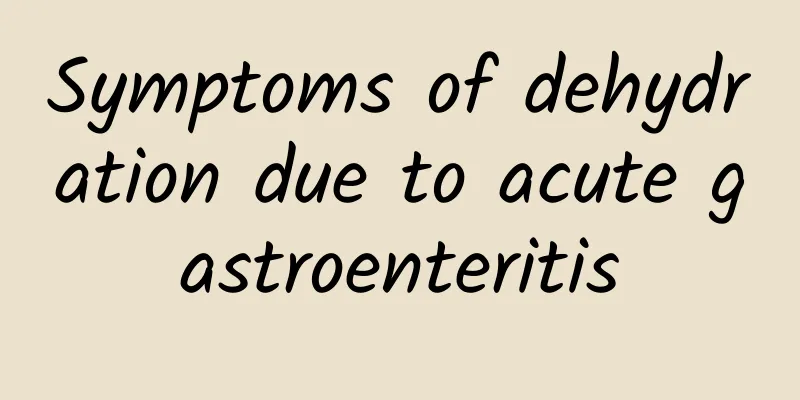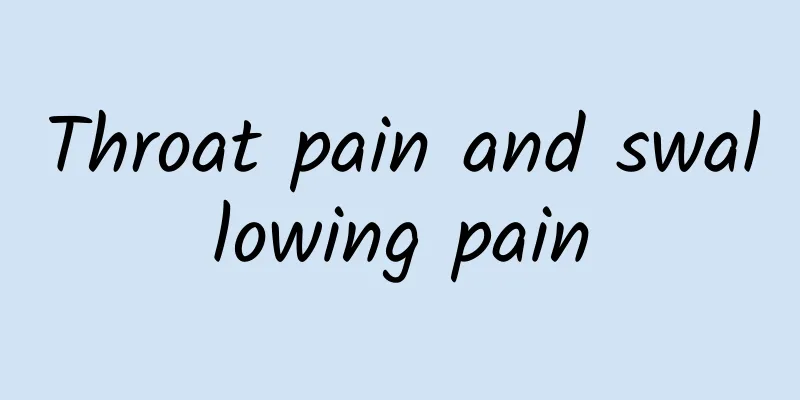Symptoms of dehydration due to acute gastroenteritis

|
The stomach is one of the organs in the body that is in direct contact with the outside world. Its surface is covered with mucous membrane. Due to different personal constitutions, eating some highly irritating foods can easily cause acute gastroenteritis, which causes unbearable pain and has a great impact on the patient's life. Acute gastroenteritis is known for its suddenness and intense symptoms. It is also a high-incidence disease. The following editor will explain the situation of acute gastroenteritis in detail. Overview Acute gastroenteritis is an acute inflammation of the gastrointestinal mucosa, with the main clinical manifestations being nausea, vomiting, abdominal pain, diarrhea, fever, etc. This disease is common in summer and autumn, and is mostly caused by improper diet, overeating, or eating raw, cold, rotten, dirty and unclean food. Causes Infections caused by bacteria and toxins The most common infections are Salmonella and halophilic bacteria (Vibrio parahaemolyticus), the most common toxin is Staphylococcus aureus, and viruses can also be seen. There are often cases of collective outbreaks or multiple outbreaks in families. The disease can be caused by eating contaminated poultry, livestock meat, or fish; eating seafood such as crabs and snails where halophilic bacteria grow; or eating leftovers or rice contaminated by Staphylococcus aureus. Physical and chemical factors Eating raw or cold food or certain medicines such as salicylates, sulfonamides, certain antibiotics, etc.; or accidentally ingesting strong acids, strong alkalis and pesticides can all cause this disease. treat General treatment Rest in bed as much as possible. If the condition is mild, take glucose-electrolyte solution orally to replenish the loss of body fluids. If vomiting persists or dehydration is obvious, intravenous supplementation of 5%-10% glucose saline and other relevant electrolytes is required. Encourage intake of light liquids or semi-liquid foods to prevent dehydration or treat mild dehydration. Symptomatic treatment If necessary, antiemetics and antispasmodics can be injected, such as belladonna, 3 times a day. Antidiarrheal drugs: such as Smecta, 2 to 3 times a day. Antimicrobial therapy The role of antibiotics in the treatment of this disease is controversial. For infectious diarrhea, targeted antibiotics can be appropriately selected. But abuse should be prevented. |
<<: Symptoms of fungal intestinal infection
>>: What water should I drink for stomachache
Recommend
What is lung swelling? What are the causes?
In recent years, the incidence of pulmonary edema...
How to take deep-sea fish oil varies from person to person
Deep-sea fish oil is a health food loved by many ...
What are the effects, functions and contraindications of Qingbanxia?
As we all know, Pinellia ternata is a traditional...
Nine months pregnant stomach discomfort
The discomfort in the stomach during the ninth mo...
Treatment of frozen shoulder: hot compress and massage are effective
As the name suggests, frozen shoulder is an infla...
The difference between early miscarriage and menstruation
The common symptom of miscarriage and menstruatio...
Should I lie flat or on my side when I have dysmenorrhea?
Menstrual problems are relatively common in women...
What to do with drooling eczema
Oral eczema is a common type of eczema, and patie...
What are the symptoms and treatments of kidney deficiency and low back pain?
Generally speaking, if people have kidney deficie...
Wild Smilax glabra efficacy
Poria is a very common herbal medicine for removi...
The efficacy of leek seeds and wolfberry soaked in water
Leek is a kind of vegetable that we often eat in ...
Pain around belly button
Pain around the belly button may be caused by inf...
Who should not eat saffron?
Rose tea is a very valuable Chinese herbal medici...
Which department should I go to for cervical spine problems?
Diseases of the cervical spine should attract eve...
What are the symptoms of prenatal syndrome
Prenatal syndrome refers to prenatal depression. ...









